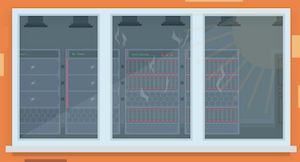
Greek provides many of the building blocks of the English language, and the concepts in Greek mythology offer a unique lens through which we examine ideas. In this case, the Greek words Kronos and Kairos represent two different ways of measuring, recognizing, and capturing the most precious resource in the world: time.
Personifying different types of time give us language to describe its fleeting passage. Kronos (the child-eating, patricidal Titan of Greek and Roman lore) is a no-nonsense quantitative timekeeper, prodding progress and linear experiences of time. In Greek and Roman mythology, Kronos, a.k.a. Saturn, eliminated all his children except one: Zeus, who would go on to rule Mount Olympus. One of his children is Kairos, the god of luck and fortune. Kairos, the light-footed grandchild of Kronos, dances unpredictably on the edge of time, bestowing luck and fortune.
In the world of K12 schools, we need to honor both concepts of time and how it’s best spent. What does time look like for educators? What about students? Let’s dive into Kronos, the practical and sequential passage of time, and Kairos, momentary luck and opportunities, and watch how they meld into a life-changing learning experience.
Kronos (chronological time)
Chronological time follows the rules closely. It’s a big part of the reason we even have rules in the first place. Kronos keeps people on task, looking toward a goal, and making incremental progress toward it. Kronos in K12 schools is the predictable motivation of time passing and daily routines.Linear: One step at a time, one day at a time, all in a row. This is chronological and linear time. Students need to achieve mastery of standards in a specific order, because knowledge is built on itself.
Longitudinal: This is a fancy K12 data term for “year over year.” Longitudinal data takes each student’s assessment results and lines them up together so educators can measure progress and growth that’s difficult to quantify or even see from the day-to-day moments teachers spend with students. It’s the way a kid seems to have sprouted twelve inches overnight because you haven’t seen them for three months—it’s the passage of chronological time to the max.
Forward: There’s no going back. We cannot unlearn (unfortunately, in some cases!) or unlive the moments already gone by. Kronos is unrelenting and he never looks back. Empirical data demands we arrange it chronologically to unlock relevant insight, spot patterns in need of intervention, and ensure students are following their own unique paths of growth. All of this is important, and we feel the watchful eye of Kronos counting grains of sand, always.
On the student side, Kronos looks like: Semester schedules. New planners. Report card inks. Push notifications. New lockers and shoes. Rubrics. Turning in assignments. Counting down to lunch.
Kairos (the moments that matter)
In contrast to chronological time, Kairos represents the flash of genius, connection, luck, or opportunity—people must take hold of it, unpredictable and wild, because no one can catch him once he’s passed. In K12 education, Kairos moments might look something like this.Chaotic: Kids are chaos incarnate, and with the talent, training, and wherewithal to harness this energy there’s no limit to what educators can accomplish. Student agency, play- or project-based learning, and other ways to place academic control into kids’ hands can increase the likelihood of this lightning-strike luck—the aha moment when a concept “clicks” in a child’s mind. There’s nothing better.
Chance: It’s impossible to schedule or plan these transient moments of connection. What education leaders can do is create conditions ripe for flashes of inspiration.
Camaraderie: Kairos can bestow individual miracles as he’d like but creating them in schools requires getting your group aligned on a common goal. District leaders do this through strategic planning, crafting missions, visions, and values statements for the school. They create a place of physical and psychological safety, and then step back and let people learn, together.
On the student side, Kairos feels like: laughing until your sides hurt. That one teacher who helped. The week your class crafted a giant cardboard dinosaur across the whole classroom. Second place in the geography bee. Losing a beloved classmate too soon. The nostalgia and excitement of the first and last days of school.
Teaching is a profession of the heart. Of Kairos, the moments that matter between people. Bring it back into balance with our empirical taskmaster. Time will always fly by. Pluck the magical moments you can as it does.
Follow-up resource: Make time for what matters most.
See how K12 school administrative software can simplify necessary administrative tasks to free up more time for students.WHAT'S NEXT FOR YOUR EDTECH? The right combo of tools & support retains staff and serves students better. We'd love to help. Visit skyward.com/get-started to learn more.

|
Erin Werra Blogger, Researcher, and Edvocate |
Erin Werra is a content writer and strategist at Skyward’s Advancing K12 blog. Her writing about K12 edtech, data, security, social-emotional learning, and leadership has appeared in THE Journal, District Administration, eSchool News, and more. She enjoys puzzling over details to make K12 edtech info accessible for all. Outside of edtech, she’s waxing poetic about motherhood, personality traits, and self-growth.




